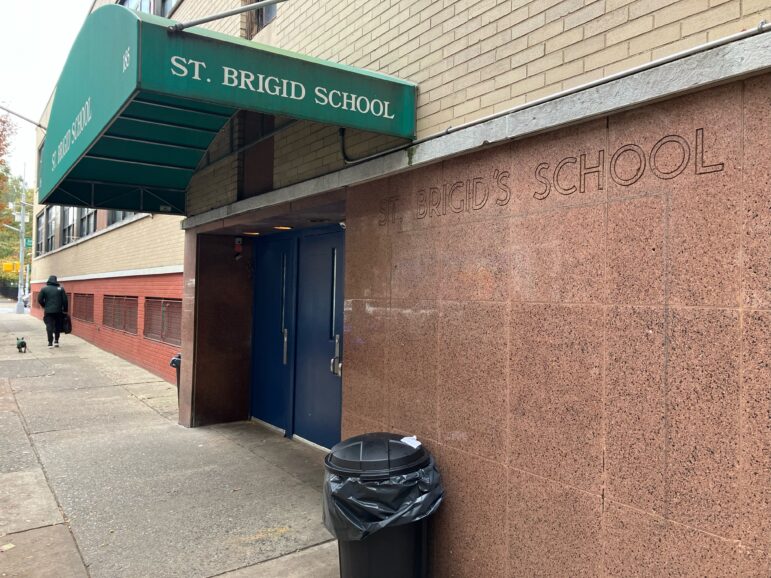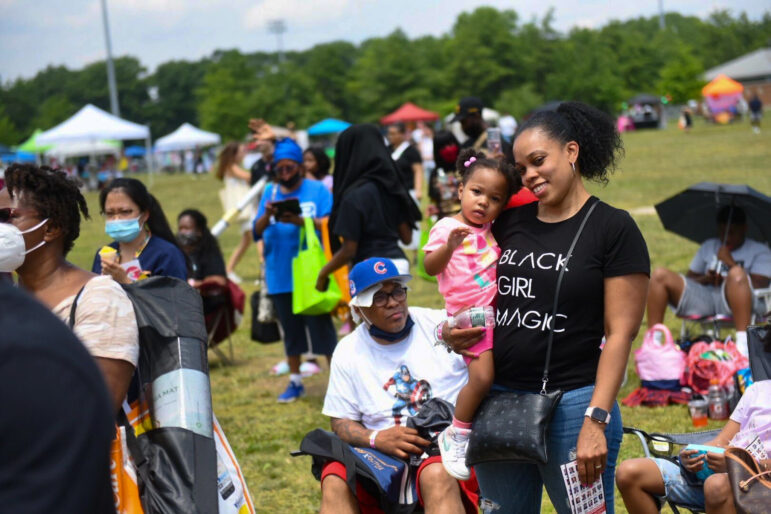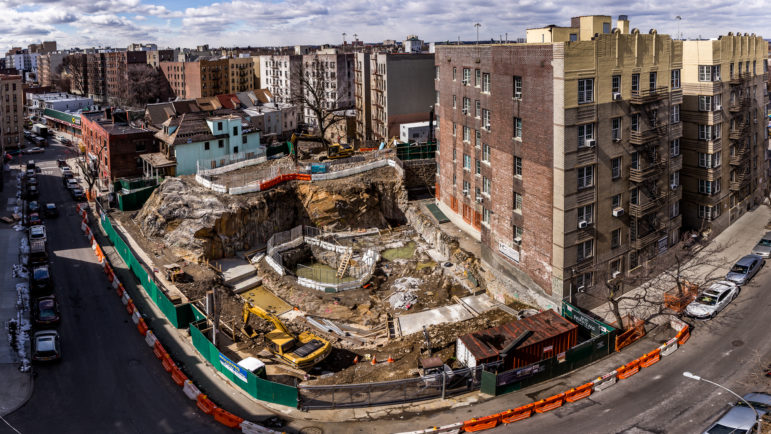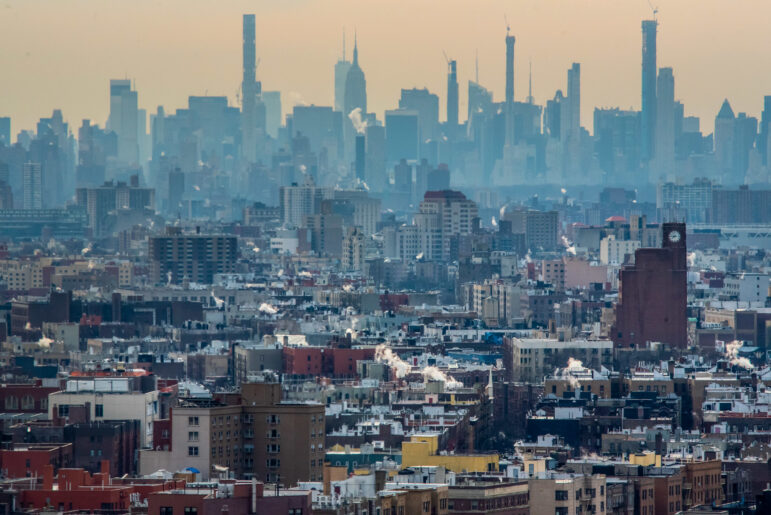Adult migrants without children seeking to extend their shelter stays will now need to prove they meet one of several “extenuating circumstances” to qualify for a bed beyond initial 30- or 60-day stints.

Emma Whitford
The former St. Brigid School building near Tompkins Square Park has been operating since last year as a “Reticketing Center,” run by New York City’s Office of Emergency Management.Lea la versión en español aquí.
The city has begun issuing tentative decisions to adult migrants without children seeking to extend their shelter stays beyond an initial 30 or 60 days, who need to prove they meet one of several “extenuating circumstances” to qualify for another bed.
The new terms are part of a legal settlement reached in March, following months of negotiations between the Adams administration and homeless advocates over New York’s decades-old right to shelter policy, which the mayor sought to amend, citing the arrival of nearly 200,000 new immigrants over the last two years, with about 65,000 currently in the city’s shelter system.
Under the settlement, adult migrants whose shelter deadlines expire can’t extend their stays unless they meet certain criteria, like if they have a disability, are recovering from or preparing for a medical procedure, or “have made significant efforts to leave the shelter system and/or leave New York City but need additional time to exit shelter.” Migrant families with children are not subject to the new rules.
Since Wednesday, May 15, the first group of migrants who’ve received the new term notices and whose stays are ending soon have been able to bring their documents to the city’s Reticketing Center in the East Village for review before they are given a final assessment.
City officials said 29 have done so so far, 15 of whom were told they didn’t meet the criteria for an extension, while 14 others were approved for more time. Those turned down were still in their shelters as of Friday because their exit deadline had not yet arrived, according to City Hall Spokesperson Kayla Mamelak. They can still reapply with additional information before they are expelled, she added.
During a press conference on Friday, Mayor Eric Adams’ Chief of Staff Camille Joseph Varlack explained that migrants can qualify in one of two ways. They can likely get an automatic extension if they meet one of the following: they’ve signed a lease that starts within a month, have an immigration proceeding, a serious medical procedure or plans to leave the city scheduled within a month, are recovering from a medical procedure that impacts their ability to leave shelter, or are 18 to 20 years old and enrolled full time in high school.
The second is by showing they’ve made “significant efforts” to leave the shelter system, criteria that’s considered on a case-by-case basis: it will count in an applicant’s favor, for example, if they’ve applied for Temporary Protected Status, are attending college or English classes, can document their job or housing searches, among other potential documentation laid out in a city notice letter.
Josh Goldfein, an attorney at the Legal Aid Society who negotiated the right to shelter settlement alongside Coalition for the Homeless, said the city used a 20-point system to evaluate the cases of the less than 30 migrants who’ve sought assessments so far, where applicants can earn points for each effort to leave shelter that they demonstrate. But the system is still being fine-tuned and negotiated, he added, and could change.
“Our designated teams will be reviewing information provided by guests, indicating why they need to remain in shelter for longer and to assist them with exit planning,” City Hall Spokesperson Mamelak told City Limits via email.
“While these new changes will require some adaptation, we are confident that they will help migrants progress to the next stage of their journeys, reduce the significant strain on our shelter system, and enable us to continue providing essential services to all New Yorkers,” she added.
Under the right to shelter settlement terms, the city should have also cleared a waitlist for recently arrived immigrants seeking a shelter bed, securing them a new placement the same day they apply. But since April 8, when that change was supposed to go into effect, the city has been scrambling to cut those wait times to under 24 hours, according to Goldfein.
“On some days, they are in full compliance, and on some days, there have been people who did not get a placement,” he explained.
Still, it’s an improvement on where things were before the deal was reached, when migrants waited days or weeks for another placement, spending their nights at one of five crowded “waiting rooms” then in operation.
“In the past, they were giving no people a placement on the same day,” Goldfein said.
Under the new settlement terms, some migrant drop-in centers can remain in operation, intended to serve those who reject other offers of shelter, arrive late at night, or just need a temporary space to stay indoors. But such facilities, which don’t have beds, can’t be used as longer term placements.
City Limits tracked the time it took several migrants to find a new bed after a visit to the Reticketing Center on May 7. Several of them were placed within 24 hours.
It took slightly longer for Mary, 42, who arrived at the East Village site at 9 a.m. on May 7 to reapply after her 30-day stint in at the city’s congregate shelter on Randall’s Island expired, and was relocated to the same site around 3 p.m. on May 8.
However, it took three days for a couple from Venezuela. Mirla and Lirio, who asked to be identified by first names only, said they spent the nights of May 7, 8 and 9 at a drop-in center based at the Church of God of East Flatbush, Brooklyn. Like other drop-in centers City Limits has reported on, migrants are asked not to sleep on the floor.
“We put chairs together to create something that resembles a bed,” said Mirla, 52, in Spanish.
During the day, they returned to the Reticketing Center to wait. Late in the afternoon of May 7, Lirio stepped outside the entrance for some fresh air, wearing a t-shirt with the words “Never stop the hustle.” His wife was still in line inside.
“She’s making friends there,” the 55-year-old said in Spanish. “Let’s see where they’re sending us today,” he added, before going back inside to wait. The couple was eventually given a placement on Randall’s Island around 9 a.m. on Friday, May 10.
The city referred to these cases, where wait times exceed more than a day, as “very rare,” and explained that this could have happened “because people leave the building before cots become available,” New York City Emergency Management (NYCEM) spokesperson Aries Dela Cruz wrote via email. However, the couple disputed this, saying they did not leave the building while reapplying.
None of the people reapplying for shelter at the Reticketing Center who City Limits spoke with earlier this month had received information about the new settlement terms, and the limited circumstances under which they may be able to extend shelter stays going forward.
Joseph Varlack said Friday that 6,500 migrants have received these new notices so far.
“If migrants upon discharge feel they have an extenuating circumstance that requires an extension of stay in shelter, they will be encouraged to speak with their exit planner and the site managers at their HERRC or Respite site,” a NYCEM spokesperson said.
One of the big questions that remains to be resolved is how those who meet the criteria for an extension will be reevaluated if they seek another one once that time is up.
“They don’t have an answer for that yet,” said Goldfein.
“The city says they don’t want to see people on the streets. Their goal is to encourage people and work with them to do what they think they need to do to try to move out,” he said. “But we’re going to be monitoring very closely to make sure that people get appropriate consideration of all the efforts that they’re making.”
Below is a copy of the notification letter detailing the city’s “extenuating circumstances”:
To reach the reporter behind this story, contact Daniel@citylimits.org. To reach the editor, contact Jeanmarie@citylimits.org
Want to republish this story? Find City Limits’ reprint policy here.








